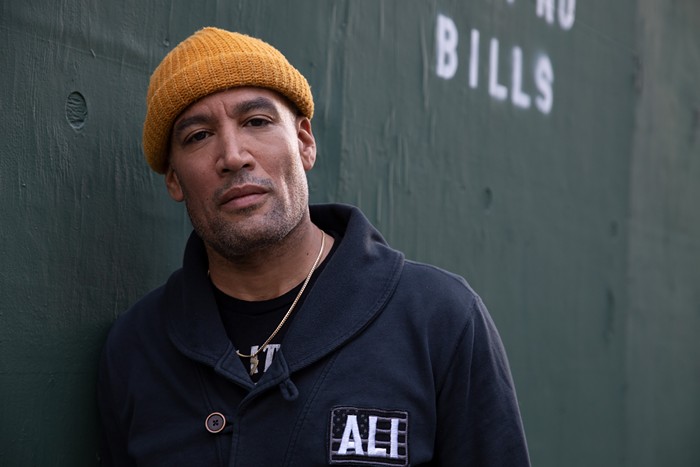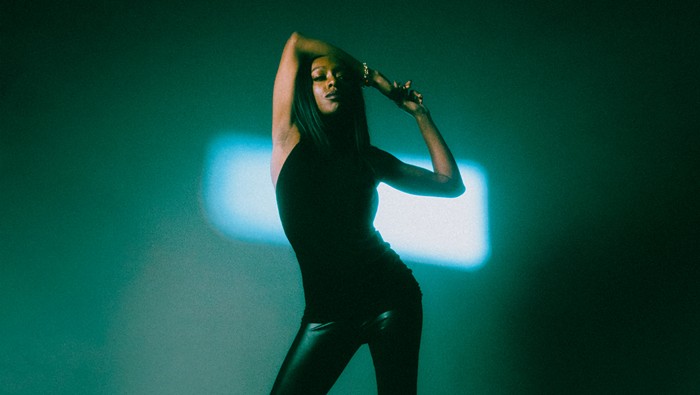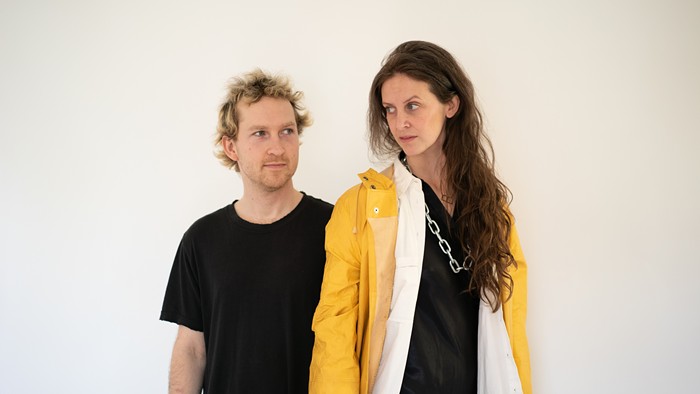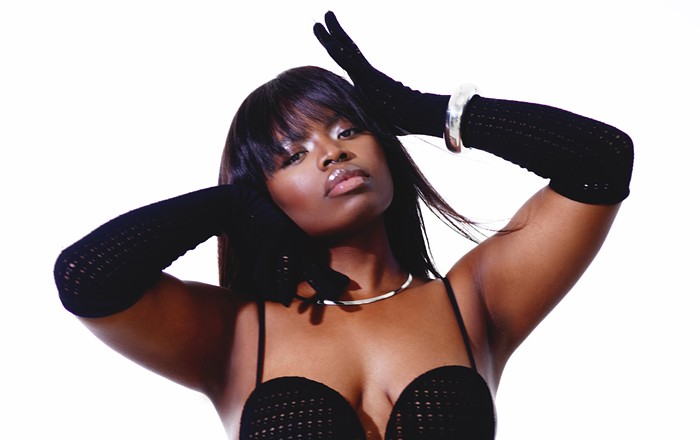Hanson recently played Portland's Crystal Ballroom and I went there, planning to ask middle brother and lead vocalist Taylor Hanson what it's like to become a conduit for spiritual forces so overwhelming they have, in most cultures and times, been cradled inside the structures of organized religion (so that mere mortals might somehow manage to embody and endure them). As Christ knows, to become the earthly embodiment of Godhead is neither easy nor self-enhancing.
The three brothers of Hanson, especially Taylor, have channeled a spiritual force so intense, mass hysteria is created by a mere sweeping of one or another of their glances across a sea of adoring fans. While those days are pretty much over--after mega-popularity with their first hit "MMMBop," the brothers have settled into simple notoriety and a fan base that had them playing the Crystal Ballroom to a sell-out crowd of 1,000, where last time through they played to 18,000 in Seattle's Key Arena--Hanson still commands a power which in our time is known only to pop stars and professional athletes. The palpable electricity that swept the Crystal Ballroom when Hanson appeared was unlike anything I have ever felt, except for the stunning effect of Michael Jordan stepping out of an elevator in Seattle's Olympic Hotel (an action which caused every man and woman in the hotel lobby to halt and then rush toward him, and made a small boy sputter and then fall down).
This power is not traceable simply to the sport, or to the music. It is imbued in the body of the musician or athlete (and in the superstructure of myth and narrative thrown up around them). After Jimi Hendrix died, Randy Hansen could play his music perfectly, note-for-note, and yet it was nothing, at best an homage and at worst a spooky reminder just how dead Hendrix really was. Similarly, Nirvana could be as compelling playing poorly as when playing well--the fact of their presence made the music, de facto, interesting. The body need not be pretty or compelling (consider Neil Young or Steve Earle); it need merely have become intertwined with the music, the flesh and spirit becoming one, so that when a fan hungers for the Godhead of pop, he or she hungers also for the body of the musician. You can imagine how exhausting it could be to inhabit such a body.
Most musicians are not up to the challenge; they care too much about themselves. Perhaps because they are young, the members of Hanson have given in, sacrificed themselves as conduits for the spiritual power of pop music. Their look and presence is no longer their own but belong to the fans who crave the power running through them. Hanson carries this off with grace and ease. Most of their fans are teenage girls whose devouring desire to have the boys of Hanson is at once simple and complete. At the Crystal Ballroom there was little anxiety, and no paradox, about this surge of flesh toward flesh; it was felt, perhaps literally, as a matter of the spirit, the music. Pop music, like Christ, subsumes the spirit seamlessly into flesh, and allows our hunger for both to blend into a single yearning--the kind of urge that had 1,000 teenage girls surging guilelessly toward these three boys with every intention of physically devouring them, should the steel fences fail and the bouncers be overcome.
Contrarily, most indie musicians (in a lineage that seems to stretch, principally, back to The Fall's Mark E. Smith) are famously uncomfortable in their bodies. Smith generally sings facing away from the crowd and I have seen him perform entire shows from behind the drums, offering no glimpse of himself. This is not shyness, but a kind of spiritual refusal, a withholding. Calvin Johnson makes a show of his own spastic anti-sexuality while Unwound's Justin Trosper stands stock-still, expressionless. Some, like Sebadoh's Lou Barlow or Steve Malkmus of Pavement, seem aware of their physicality and sensuality, yet regard it with suspicion while on stage. Neither is willing to play the role of star, or when they do, it appears as mockery. Barlow's famous peevishness is anchored in a deep ambivalence about the audience's intense regard for the musician. He seems to regret or resent the usual conflation of music with musician and so will fight or flee in the face of adulation or crowd desire. Other bands (Some Velvet Sidewalk) twist and bend to hide their bodies or at least mask their crotches. Mostly, this is the history of men uncomfortable with the cock-rock posings of past pop stars, trying to negotiate a different male presence on the stage. Contorting or desexualizing their bodies must appear to be the only antidote to the ready-to-rape postures of the past.
These examples are contradicted by scores of indulgently sensual bands, The Dandy Warhols to name one. Yet, interestingly, such blatant sensuality usually gets cast (by critics, if not by the bands themselves) as irony or a knowing joke or some kind of meta-comment on rock music and sex. There is a deep discomfort with the spirit made flesh in indie pop, and only a very few musicians have the strength or generosity to give themselves over to it. The end result, however, is to deprive the audience of a principal conduit of the power in pop music, the body of the musician.
The other conduit is The Hit, the repudiation of which is the deepest orthodoxy of indie rock. The Hit is indie music's unforgivable sin, an embarrassment. Harvey Danger, a wonderful pop group from Seattle, had the great misfortune of producing the radio and MTV hit "Flagpole Sitta," to which song they were beholden for nearly three years. Despite their great intelligence, impeccable spirit, and very catchy tunes, the fluke of "Flagpole Sitta's" success made Harvey Danger a sometime-joke among their colleagues; I could always get a chuckle of interest from local musicians or music producers by proclaiming my deep love and respect for their music.
A similar dynamic followed the ascension of Pavement's 1994 song "Cut Your Hair" into the pantheon of MTV and "fraternity favorites." By no means a financial hit on the scale of "MMMBop" or even "Flagpole Sitta," "Cut Your Hair," became popular enough with an audience outside the puritanical confines of indie rock to embarrass the very musicians who had created it. In the years following the song's success, the playing of it was trotted out at shows with such heaping dollops of irony that it was impossible to enjoy the song for the great pop hit that it was. Obviously the musicians of Pavement valued their own poses and amusement above the strict demands of The Hit--with its need for exact reproduction--and they fucked with the song enough to remain above it. Harvey Danger performed similar antics, for many months, around "Flagpole Sitta," until they finally refused to ever play it again.
Hanson, perhaps because they lack irony or they are young, have never betrayed The Hit, which in their case is "MMMBop." At The Crystal Ballroom they played it near the end of the show, just before the slow ballad "I Will Come to You." The audience knew it was coming (Taylor had, for the first time in the show, approached his bongos) and Hanson executed it with absolute precision and convincing enthusiasm. The effect was electrifying, plunging the crowd into a kind of mass ecstasis which is best described by Suetonius in his discussion of the Bacchic orgies of Ancient Greece. Hanson have played "MMMBop" more than 3,000 times. Yet, they did not show any weariness or coyness about playing it again. This is the pinnacle moment of pop, requiring supreme grace and strength from the performer. The intensity of fan desire is never greater than during the execution of The Hit. At this moment, the pop musician is on the verge of complete erasure as The Hit casts its spell upon its audience. In between these two--the audience and The Hit--the musician stands, trapped in a body that has become conflated with the music so that he is suddenly exposed as, not only the conduit, but also the only obstacle between the maddened crowd and Godhead.
Hanson's strength in the face of this surpassing moment makes their indie pop peers look like selfish weaklings. Hazel, Harvey Danger, Sebadoh, Pavement, have all failed in their own ways; Nirvana managed to give themselves over, but at huge cost. Yet the cost buys something priceless. I've never seen such joy and so deep and transforming spiritual communion as I witnessed at the Hanson concert.
I never got to ask Taylor my question about the power of pop. Backstage access was jealously guarded. And here is the corrosive flip side to the stunning openness and generosity of the committed pop musician--there is next to nothing left of the private person, and what is left must be secreted away, kept separate from the figure offered to the fans. In the face of this cost, it's clear why any sane person would refuse the burden of pop stardom; thank God for the folly of youth.


















